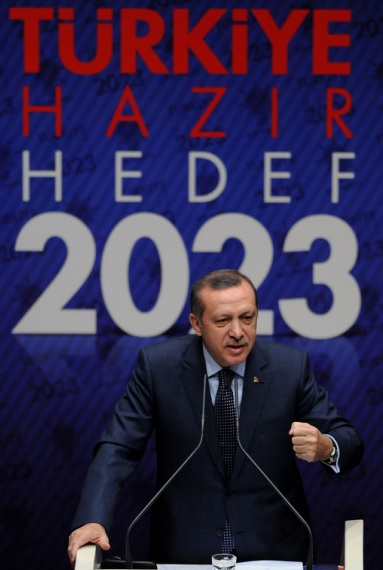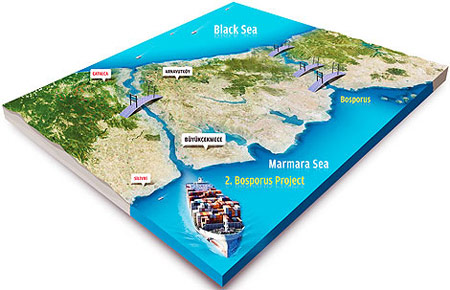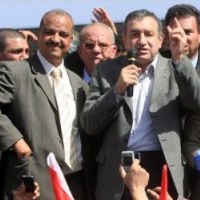![]()
Mon, May 02, 2011 | Turkey Analyst, vol. 4 no. 9 | By Gareth H. Jenkins

Prime Minister Tayyip Erdoğan and the AKP’s election manifesto, entitled “Turkey is ready… Target 2023”.
The AKP’s Election Manifesto: The Silences That Ring Alarm Bells
This article was first published in the Turkey Analyst (www.turkeyanalyst.org), a biweekly publication of the Central Asia-Caucasus Institute & Silk Road Studies Program Joint Center.
In late April 2011, the ruling Justice and Development Party (AKP) and the main opposition Republican People’s Party (CHP) announced their manifestos for the Turkish general election on June 12, 2011. It is rare for political parties to deliver on all of their pre-election commitments; and many of the promises in both documents are anyway manifestly unworkable. Nevertheless, the content of the CHP’s manifesto demonstrates how far it has moved — in rhetoric at least — towards becoming a fully-fledged social democratic party since Kemal Kılıçdaroğlu became leader in May 2010. But, for the AKP, which currently appears set to win a comfortable majority on June 12, it is not its promises but its silences that cause the most concern; particularly its failure even to formulate policies to address the deepening alienation of the country’s Kurdish minority.
Background
On April 16, 2011, Prime Minister Tayyip Erdoğan held a press conference to launch the AKP’s election manifesto. Entitled “Turkey is ready… Target 2023”, the 156-page document outlined the policies that the AKP would pursue not over the next four year parliamentary term but the twelve years until the 100th anniversary of the foundation of the Turkish Republic in 2023.
The AKP promised that, once re-elected, it would immediately begin work on drafting a new constitution that would be “democratic, free, participatory and in accordance with the requirements of the age.” The manifesto failed to provide any details. However, it is an open secret that Erdoğan’s main priority for a new constitution is the replacement of the current parliamentary system with a presidential one; after which he aims to have himself elected as president for two successive five-year terms.
The AKP manifesto detailed a list of ambitious economic targets for 2023, including tripling the country’s Gross Domestic Product (GDP) to over $2 trillion, raising per capita GDP to $25,000, increasing electricity production by 150 percent and more than halving unemployment to 5 percent. It also promised to offer the 500,000 Turkish couples who get married each year interest-free 25-year loans of TL 60,000 (approximately $40,000) to enable them to buy their own homes. It did not explain how the scheme was going to be financed.
In addition, the AKP listed a series of grandiose projects which would all be completed by 2023, including: building an entirely Turkish-made passenger aircraft, which would be sold to neighboring countries; an indigenous defense industry which would produce wholly Turkish-made “national rifles, artillery, tanks, helicopters, warplanes and unmanned aerial vehicles”; a third international airport for Istanbul; two new cities on the European and Asian shores of Istanbul; and the launch of a national space program.
However, Erdoğan reserved his most grandiose scheme for later. On April 27, 2011, he held a special news conference to announce plans to provide an alternative maritime passage through Istanbul by building a 50 kilometer (30 mile) canal to the west of the city. AKP supporters immediately hailed Erdoğan as a visionary, predicting that the canal would pay for itself through transit fees from the maritime traffic that currently passes through the Bosphorus. Environmentalists responded by predicting that, even if building the canal was technically possible, it would be an environmental disaster. Skeptics noted, rather than being new, that a similar scheme had been proposed by the Ottoman Sultan Abdülhamit II in the late nineteenth century. They also pointed out that Erdoğan’s canal could never pay for itself. Under the 1936 Treaty of Montreux, Turkey is forbidden from obstructing commercial traffic through the Bosphorus. The new canal would not significantly reduce voyage times. It is difficult to envisage ship-owners opting to pay to use the new canal when their vessels could continue to use the Bosphorus for free; while any attempt by Turkey to abrogate the Treaty of Montreux would result in a dangerous confrontation with the littoral states of the Black Sea, led by Russia.
The CHP published its manifesto in the form of a small booklet, 134 pages long and entitled “A country of freedom and hope. Everybody’s Turkey”. It also led with plans for a new constitution. However, unlike the AKP, the CHP both asserted its commitment to retaining the parliamentary system and announced details of what it believed a new constitution should contain, including: the guarantee of greater freedoms for all; the elimination of discrimination based on ethnicity, religion, gender, sexual orientation or age; the reform of the Directorate for Religious Affairs (Diyanet) to serve all religious communities rather than only Sunni Muslims as at present; a lowering of the 10 percent threshold for representation in parliament; limitations on parliamentary immunity; and, in an implicit reference to the country’s Kurds, a commitment to allowing people to be educated in their mother tongue, although it stops short of proposing bilingual education, which is what the Kurdish movement is demanding.
The CHP’s economic program focused on reducing regional discrepancies and trying to boost economic activity in the poorest areas of Anatolia; including three pages on plans to encourage the economic development of the predominantly Kurdish southeast of the country. Like the AKP, the CHP set some targets for 2023, including increasing GDP to $2.6 trillion and reducing unemployment to 6 percent, while nearly doubling female participation in the workforce to 40 percent.
The CHP also promised to remove restrictions on trade union rights, ensure that everyone is covered by the social security system, lower indirect taxes and raise income tax rates for the rich. In addition, the manifesto vowed to introduce a system of income support under which all low income families would receive at least TL 600 ($400) from the state, rising to TL 1,250 ($830) for those caring for the sick or disabled. In each case, the money would be paid to the women of the households. No details were given of how the scheme would be financed.
Implications
Although both share a tendency to avoid explaining how their promises will be financed, in most other ways the two manifestos could not be more different. In the AKP manifesto, the emphasis is on power, prestige and muscular self-assertion. In the CHP manifesto, the tone is palpably humbler, with an emphasis on equality, freedom and acceptance of difference.
The contrast is particularly striking in the sections on foreign policy. The AKP trumpets what it describes as the triumphs of its “principled foreign policy” that has already made Turkey the “most influential political actor in its region” and an “inspiration for others” that will soon become a “global leader”. The AKP section on foreign policy is even entitled “Leader Country”. The CHP adopts a more conciliatory approach, promising to defend Turkey’s interests but focusing on cooperation with other members of the global community and the application of international standards.
Perhaps most remarkable is the contrast in attitudes towards the EU; to which both parties devote a mere page. Deniz Baykal, who led the CHP from 2000to 2010, was notorious for his nationalistic, often xenophobic, rhetoric and his excoriating attacks on the EU. However, the CHP’s 2011 election manifesto acknowledges that Turkey has yet to meet the criteria for EU accession and pledges to overcome its shortcomings through cooperation and consultation with other social democrats in the EU.
In contrast, after noting that it still regards EU accession as a strategic goal, the AKP manifesto devotes most of the rest of the section to lambasting “some European countries” for “unfairly blocking” Turkish accession. No mention is made of the many reforms that the AKP has yet to make in order to meet the criteria for EU membership. Instead, the manifesto warns the EU that it is doomed to impotence and irrelevance unless it accepts Turkey as a member. The AKP manifesto also states that the party “regards foreign policy and events in the world from a civilizational perspective”. It makes it clear that it regards Turkey and the West as belonging to different “civilizational” entities, which are not only in apposition but also in opposition to each other.
However, the most worrying element of the AKP manifesto is not what contains but what it does not; namely any plans to address the Kurdish issue, which is now arguably the most urgent problem facing Turkey. With the exception of a few self-congratulatory sentences on the AKP’s short-lived — and now moribund — attempt in 2009 to initiate a process of consultation with the Kurds, the so-called “Democratic Opening”, no details are offered as to how the Kurdish issue would be solved. Although many Kurds would have been skeptical of any promises in the AKP manifesto — as some doubtless are about those made by the CHP — the AKP’s failure even to pay lip service to addressing their concerns will only deepen their sense of alienation; indeed, their frustration and anger were clearly manifested in the mass protests that the Kurds staged two weeks ago after the initial decision of the Supreme Electoral Board to veto Kurdish independent candidates to the election.
Conclusions
Not even the most enthusiastic supporters of the CHP expect the party to win enough seats in the June 12 election to secure a parliamentary majority or to form a coalition government. As a result, although it demonstrates how the party has been transformed under Kılıçdaroğlu’s leadership, in terms of the future direction of Turkish politics, the CHP election manifesto is only of academic interest.
But the same cannot be said of the AKP manifesto, which in tone and content provides a clear indication of Erdoğan’s attitudes and priorities if, as expected, he wins a comfortable majority on June 12. Although the manifesto’s aggressive self-confidence and antagonism towards the West bode badly for Turkey’s relations with the EU and the U.S. [and Israel, cp], it is in domestic politics that the greatest dangers lie; and here it is the manifesto’s silences that cause the most concern.
There is no indication that the AKP has any intention of attempting to eradicate the endemic corruption and nepotism, halt the suppression of free speech and curb the persecution of the government’s opponents. Yet more alarming is the AKP manifesto’s failure even to attempt to address the grievances of the country’s increasingly alienated Kurdish minority, a growing number of whom now believe that the only solution likes in autonomy or full independence for the southeast of the country.
Although it would cause problems for Turkey’s allies, the country could weather a further cooling in its relations with the West. However, Turkey is unlikely to survive in its current form unless it takes urgent measures to address the Kurdish issue. The momentum for separation is not yet irreversible, but time is running out.
You can read AKP’s 2011 election manifesto here (in Turkish) and CHP’s 2011 election manifesto here (in Turkish).
About the author,
Gareth Jenkins, a Nonresident Senior Fellow with the CACI & SRSP Joint Center, is an Istanbul-based writer and specialist of Turkish Affairs.



 RSS
RSS














The AKP’s Election Manifesto: The Silences That Ring Alarm Bells | #AKP #CHP #Turkey #Turkiye #Islamism http://j.mp/l0BmGb
RT @CrethiPlethi: The AKP’s Election Manifesto: The Silences That Ring Alarm Bells | #AKP #CHP #Turkey #Turkiye #Islamism http://j.mp/l0BmGb